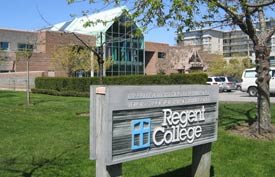Regent College

About Regent College
In the mid-1960s in Vancouver, British Columbia, a group of business people got together to discuss the formation of a new theological school. Unlike other theological institutions that trained people for "professional ministry," this school had a distinctive vision. It was a vision characterized by three central elements: it was to be a transdenominational graduate school that prized the denominational heritage brought by each new student, it was to have an emphasis on the whole people of God, and it was to be located on a university campus.For more than 30 years, Regent College has been a unique place to study. Continuing the vision of its founders, Regent takes seriously the education, nurturing and equipping of the laityââ?¬â?the whole people of Godââ?¬â?to live and work as servant leaders in vocations within the home, the marketplace, and the church. Regent encourages a vibrant Christianity that affirms the primacy of personal godliness and the importance of spiritual and intellectual integration in all walks of life. To this end, the College also prepares Christian leaders who will further this mission through the ministry of the local congregation.
Far from being a cloister of intellectuals who think and look alike, Regent is a community of Christians seekingââ?¬â?through theological studiesââ?¬â?practical tools for spiritual growth and ministry in both church and marketplace settings. Regent is a truly international community. While a little over 40% of the student body is Canadian, an almost equal number come from the United States, along with many from Asia, Australia, Europe, Latin America and Africa. This global blend of nationalities challenges students to expand their faith beyond their own cultural context.
Nearly 700 (350 full-time equivalent) students are enrolled in full- and part-time studies at Regent College during the academic year. Spring and Summer Schools and off-campus extension courses also enable many more to benefit from the rich curricular offerings of the College.
In addition to their cultural diversity, the students represent a great variety of vocational and denominational backgrounds. Amidst this diversity, students find they share many common questions on how to apply their faith in the church and the world. The interchange of ideas from a wide variety of perspectives around a common centre has proven to be an enriching and stretching experience.
British Columbia Universities
- Art Institute of Vancouver - Burnaby , British Columbia
- BCIT - Burnaby , British Columbia
- Camosun College - Victoria , British Columbia
- Capilano University - North Vancouver , British Columbia
- College of New Caledonia - Prince George , British Columbia
- College of the Rockies - Cranbrook , British Columbia
- Columbia College - Vancouver , British Columbia
- Corpus Christi College - Vancouver , British Columbia
- Douglas College - New Westminster , British Columbia
- Emily Carr Institute of Art & Design - Vancouver , British Columbia
- Justice Institute of British Columbia - New Westminster , British Columbia
- Kwantlen Polytechnic University - Surrey , British Columbia
- Langara College - Vancouver , British Columbia
- Nicola Valley Institute of Technology - Merritt , British Columbia
- North Island College - Courtenay , British Columbia
- Northern Lights College - Dawson Creek , British Columbia
- Northwest Community College - Terrace , British Columbia
- Okanagan College - Kelowna , British Columbia
- Quest University Canada - Squamish , British Columbia
- Royal Roads University - Victoria , British Columbia
- Selkirk College - Castlegar , British Columbia
- Simon Fraser University - Burnaby , British Columbia
- The University of British Columbia - Vancouver , British Columbia
- The University of Northern British Columbia - Prince George , British Columbia
- The University of the Fraser Valley - Abbotsford , British Columbia
- The University of Victoria - Victoria , British Columbia
- Thompson Rivers University - Kamloops , British Columbia
- Trinity Western University - Langley , British Columbia
- University Canada West - Victoria , British Columbia
- Vancouver Community College - Vancouver , British Columbia
- Vancouver Island University - Nanaimo , British Columbia
- Vancouver School of Theology - Vancouver , British Columbia
